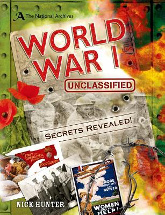World War 1, unclassified by Nick Hunter

Bloomsbury, 2014. ISBN 9781472905253.
(Age: 9+) Warmly recommended. World War 1, Archives. Another book
produced with the authority of The National Archives in Britain,
this is a fascinating introduction to the events and times of World
War 1 and will be a boon to those looking at war, as it gives access
to a range of documents, photos, diaries, postcards and maps usually
not seen in the text books.
Looking at the contents page gives an overview of what is inside,
and it includes some topics which can prove elusive to the student.
The opening chapter shows life in the trenches, then the book harks
back to the reasons for the war occurring, each double page covered
with a meaningful brief text, photo, maps, and quotes, with a WW1
fact file containing an interesting piece of information. The
expected chapters are there, Digging in, Trench life, Beyond the
Western Front, Home front, each with a plethora of information,
followed by chapters on topics such as Treating the wounded,
Munitions factories, The war at sea, New weapons and War with words.
The last chapters, Armistice, The cost of war, and Lest we forget,
bring this whole to a sombre close.
The book concludes with a double page timeline, a double page
glossary, and then two pages of extra references and resources, with
a well stocked index at the end.
All in all a fascinating introduction to World War 1 for the younger
child, and an admirable text for the older primary student. I am
sure it will be well used in the library and classroom. I was
particularly taken with the postcard on page 15, an example of what
the men sent home. A wish or Christmas with a soldier pointing his
gun at the recipient! On the following page is a photo of a trench
system before and after bombing, and it beggars belief that people
survived in the trench. A photo too of a horse drawn ambulance on
page 29 got me thinking about transport on the battlefield, while
the photo on page 44 of a wounded man being carried off the field n
1917, brought home the difference between the land at the start and
finish of the war.
Even though I have taught this topic for decades I found this an
interesting and evocative book about a war which began one hundred
years ago.
Fran Knight